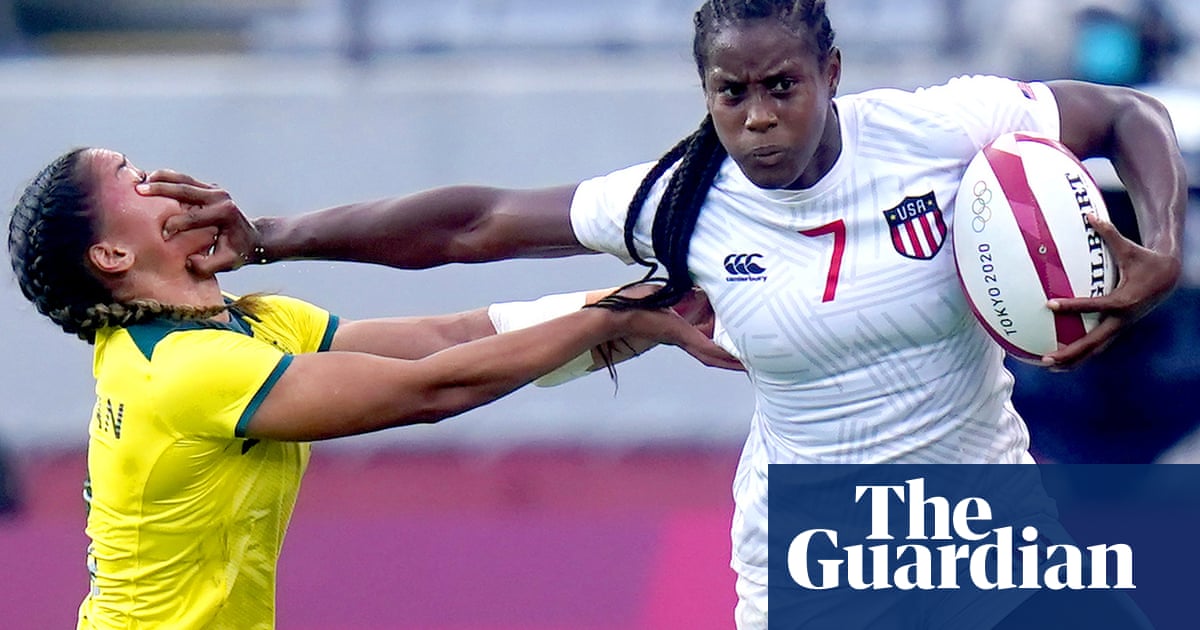Naya Tapper, one of the great names of US rugby, will retire after the Olympic Games in Paris. With the women’s Eagles sevens squad, she has a good chance of going out with a medal – potentially precious gold.
Announcing her decision, Tapper said that to put it “as simply as possible”, preparing for her “second Olympics as co-captain while at the same time planning my transition from the sport [has been] a whirlwind of trying to make sure I enjoy these last moments with my team while juggling the importance of performing to a gold medal standard and making sure I have a job after all this.”
Such is life as a rugby Olympian: challenges huge, financial rewards small. Like most Americans, Tapper did not grow up with the sport. A high-school All-American track star, she found rugby at college and became a winger, has played sevens for eight years, 15-a-side internationals too, and now, at 29, is set for her second Games.
“Preparation has been really good,” Tapper told the Guardian before flying out for a pre-Games camp in Tours. “We brought in the USA high school under-18 boys team, to allow us to train against higher speeds, different, steppy players. It’s really increased our field knowledge, our skills, our impact on defense and attack, going up against people that are faster, stronger, steppier than you.”
Like Kevon Williams, the men’s captain also heading to a second Olympics at the head of a squad with a tougher pool draw, Tapper said Paris would in some ways feel like her first taste of the true Games, given that thanks to Covid, Tokyo 2020 was played a year late, without stadium crowds.
“Knowing that we’ll actually have fans and supporters there cheering us on, it makes it a lot more exciting,” Tapper said. “Knowing that my family will be there makes it a lot more inspirational. Knowing that it’s really important for us to perform well there, to put our organisation in a good place going into the build-up to Los Angeles in 2028.
“A lot of pressure, but that’s important. And so we’re hoping to go out there and get that gold medal and actually get the full experience this time. I’m looking forward to that.”
Looking further ahead, Tapper – nickname, “Naya On Fiya” – will continue to work on the Naya Tapper Scholarship, run with OMBAC Wallabies Youth Rugby, of San Diego, to offer financial assistance to young players.
Asked to pick out Eagles to keep an eye on in Paris, first in pool play against Japan, Brazil and France, Tapper picked out Ilona Maher, a big forward with a big social media presence, and “myself, Sammy Sullivan, Kristi Kirshe … And I want to say in terms of a newer face, I think Stephanie Rovetti is going to shock a couple of people with her speed.”
Rovetti is a crossover athlete, out of “D1 basketball at BYU. She came out here at an older age, normal to the age girls come in, and has been able to secure a spot on the Olympic roster. I think she’s gonna do incredible things.”
Williams has been doing incredible things for the men’s Eagles as long as Tapper has been doing the same for the women. He played football at college – this is his second Games too. At 33 it may also be his last, unless like the great Eagles flier Perry Baker, twice world player of the year, now heading for his third Olympics, Williams decides to play into his late 30s.
In Paris, Williams will lead a squad facing a tough draw: the French first, then Fiji and Uruguay. Get through that and New Zealand, South Africa and Argentina will likely lurk in the knockouts.
after newsletter promotion
Fiji won men’s Olympic sevens gold in 2016 and 2021 but it could be the hosts provide the toughest challenge this time. At the Stade de France they will field Antoine Dupont: the best player in world rugby, used to leading Les Bleus in 15-a-side in that daunting arena.
“I don’t want to say you just take it with a grain of salt,” said Williams, who definitely won’t when he faces Dupont at scrum-half. “France are the best team in the world right now. We know in the times we’ve lost to them where we’ve messed up and in the times we’ve beat them what we’ve done well.
“The man people call the world’s best player will be on that team and without a shadow of a doubt he is a great player. But we’ll back ourselves and see certain opportunities and we understand in this game that sometimes it’s just about making sure you get one more try than they get against you.”
Games of sevens last seven minutes each way. Much, including Olympic gold, can depend on the absurd bounce of an oval ball.
Dupont has made a roaring success of his sevens switch but another 15s great, the Australia flanker Michael Hooper, did not make the cut. Asked for his thoughts about big names seeking Olympic glory without playing the sevens circuit year in, year out, Williams said: “It’s kind of hit or miss. I guess it depends on the position.
“Obviously 15s players, when they come into the game, they’re gonna get glorified, they’ll get all the hype … but they are two separate games. Dupont has done a great job showing that he can be a man of both games and you got other players who’ve come in and have performed well, who can meet the different level of fitness … So being able to come into that space and prove you can do it? More power to you.”
The US men have improved in Olympic sevens, from ninth in Brazil in 2016 to sixth in Japan. The women were fifth in Rio and sixth in Tokyo. Now for Paris.







